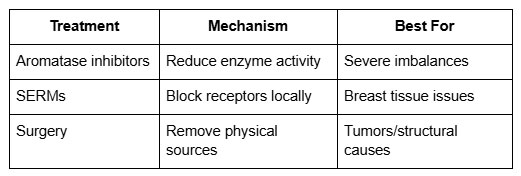High Estrogen in Men: Signs, Symptoms, and Solutions

When your body's hormone levels fall out of sync, it can feel like an invisible battle. One common but often overlooked issue is an imbalance in estrogen levels, which can silently disrupt your health and vitality. If left unchecked, it may lead to noticeable changes like fatigue, mood swings, or even physical symptoms.
Understanding the symptoms early is key to taking control. Whether through medical treatments or natural adjustments, restoring balance is possible. This guide will arm you with the knowledge to identify warning signs and take decisive action.
Key Takeaways
- Spot early signs like fatigue and mood changes.
- Physical symptoms may include unexpected weight gain.
- Medical and natural solutions can restore balance.
- Regular check-ups help monitor hormone health.
- Lifestyle adjustments play a crucial role.
Understanding High Estrogen in Men

Behind every strong man is a finely tuned hormonal battalion working in sync. When these hormones align, your body operates at maximum efficiency-but imbalance can sabotage performance. Here’s how estradiol and testosterone estrogen dynamics shape your health.
The Role of Estradiol in Male Physiology
Estradiol isn’t just a female hormone-it’s a key player in male sexual function and bone strength. Think of it as your skeletal system’s reinforcement team. Low levels weaken defenses, while optimal amounts support heart health and cholesterol control.
Testosterone and Estrogen: A Tactical Alliance
Your body converts testosterone into estrogen via the aromatase enzyme. This biochemical negotiation ensures hormonal equilibrium. Too much conversion? Your energy and muscle mass may retreat. Too little? Joints and cognition could suffer.
- Estradiol commands sexual performance like a five-star general.
- The aromatase enzyme acts as a translator between hormonal forces.
- Balance is non-negotiable for mission-ready vitality.
Normal Estrogen Levels in Men
Your hormonal battlefield needs precise intel-knowing normal estrogen levels is mission-critical. Without this intel, you’re fighting blind. Let’s break down the two key forms and their optimal ranges.
Types of Estrogen: Estrone vs. Estradiol
Not all estrogen is created equal. Estradiol is the powerhouse-it governs bone density, brain function, and sexual health. Estrone, its quieter counterpart, plays backup but can spike under stress. Keep both in check.
Age-Specific Ranges
Your levels shift with age. Below, the recon data for each phase:

- Blood tests are your best intel source-track both forms.
- Pediatric ranges differ sharply; don’t use adult benchmarks for young recruits.
- Optimal estrogen levels fuel strength and stamina.
Key Symptoms of High Estrogen in Men

Hormonal imbalance isn’t silent; it fights dirty with visible and hidden symptoms. Your body rebels when estrogen overpowers testosterone-here’s how to decode the distress signals.
Physical Signs
Breast tissue expansion (gynecomastia) is a red flag-80% of cases trace back to hormone chaos. It’s estrogen’s occupation of male terrain.
Erectile dysfunction from hormonal shifts isn’t just plumbing failure. It’s friendly fire weakening performance.
Emotional and Cognitive Effects
Your mind becomes a foggy battlefield. Mood swings, fatigue, and memory lapses are sabotage tactics. Fat stores double as estrogen factories, fueling the assault.
Long-Term Health Indicators
Prolonged imbalance risks bone density erosion-osteoporosis isn’t just a women’s war. Your skeleton’s structural integrity is on the line.
- Gynecomastia = estrogen’s frontline advance
- ED signals hormonal betrayal
- Brain fog disrupts mission readiness
- Fat fuels estrogen production
- Bone weakness invites long-term risk
Causes of Elevated Estrogen Levels
Your hormonal balance is under siege-identify the enemy forces driving estrogen dominance. Whether from internal malfunctions or external assaults, these triggers demand reconnaissance.
Medical Conditions: The Internal Saboteurs
The liver acts as your hormonal command center, processing 90% of circulating estrogen. When compromised by disease or tumors, it fails to neutralize excess, allowing estrogen insurgents to regroup.
Conditions like cirrhosis or fatty liver disrupt this critical mission. Even benign tumors can hijack hormone production, escalating the threat.
Lifestyle Factors: Fueling the Rebellion
Adipose tissue is a rogue supply depot-it converts testosterone into estrogen via aromatase. Obesity amplifies this conversion, with alcohol boosting aromatase activity by 40%.
- Alcohol: A double agent that impairs liver function and accelerates estrogen production.
- Sedentary habits: Weakens metabolic defenses, letting fat stores stockpile estrogen.
Medications and Environmental Toxins

Pharmaceuticals like antibiotics or antipsychotics act as fifth columnists, secretly elevating levels. Meanwhile, xenoestrogens in plastics and pesticides mimic estrogen, conducting covert operations.
Fortify your defenses. Audit prescriptions, ditch plastic containers, and prioritize liver support to reclaim hormonal territory.
How High Estrogen Is Diagnosed
Diagnosing hormonal shifts is like decoding a battlefield report-every detail matters. Your body’s signals reveal hidden imbalances, and catching them early ensures you stay mission-ready. The right tests and expert analysis are your tactical advantage.
Blood Tests and Lab Interpretation
A comprehensive blood panel is your first strike. It measures estradiol, estrone, and testosterone levels to expose imbalances. Results typically process within 7 days-arm yourself with this intel.
Deciphering lab reports requires precision. Elevated estradiol or low testosterone ratios signal trouble. Work with your medical team to analyze the data like a cryptanalyst.
When to Suspect an Imbalance
Deploy diagnostics if you experience a cluster of symptoms-fatigue, mood swings, or unexplained weight gain. Persistent issues demand a hormone panel to rule out sabotage.
Your long-term health depends on vigilance. Schedule testing at the first sign of infiltration. Early detection keeps your hormonal defenses strong.
Medical Treatments for High Estrogen

Combatting hormonal imbalance requires tactical precision-medical treatments offer powerful solutions. When lifestyle changes aren’t enough, medications and advanced therapies become your frontline defense. These tools dismantle excess estrogen with scientific accuracy.
Aromatase Inhibitors: Precision Strikes
Anastrozole and exemestane are elite aromatase inhibitors. They slash estrogen production by 50–70%, per clinical trials. Think of them as specialized snipers neutralizing hormonal threats at the source.
Selective Estrogen Receptor Modulators
SERMs like tamoxifen block estrogen’s advance in breast tissue. They’re strategic barriers, preventing testosterone estrogen conversion from wreaking havoc. Ideal for gynecomastia without systemic side effects.
Root Cause Elimination
For 5% of cases, surgery removes tumors or damaged glands. It’s a scorched-earth tactic-permanently erasing estrogen factories. Always pair with post-op hormone monitoring.

Deploy these strategies under medical oversight to lower estrogen levels safely. Victory requires a tailored battle plan-never go in unarmed.
Natural Ways to Lower Estrogen

Your body's hormonal warfare demands strategic countermeasures-natural solutions can turn the tide. Before calling in medical reinforcements, arm yourself with foods, movement, and environmental tactics to lower estrogen naturally. These methods fortify your defenses without harsh side effects.
Estrogen-Blocking Foods: Your Dietary Infantry
Broccoli sprouts spearhead this mission-they boost estrogen excretion by 50%. Cruciferous vegetables like kale and Brussels sprouts contain sulforaphane, a compound that neutralizes excess hormones. Flaxseed, despite its phytoestrogens, helps regulate levels by binding to receptors.
Exercise and Fat Reduction Tactics

150 minutes of weekly exercise reduces aromatase activity, the enzyme converting testosterone to estrogen. Focus on:
- Strength training: Preserves muscle mass and burns fat stores.
- HIIT workouts: Short bursts elevate metabolism for 48+ hours post-exercise.
Xenoestrogen Elimination Protocols
Plastics and pesticides mimic estrogen-swap them for glass containers and organic produce. BPA-free alternatives cut xenoestrogens by 75%. Sauna sessions further purge toxins through sweat.
"Natural interventions are your first line of defense-consistent action wins the hormonal war."
Risks of Untreated High Estrogen
Ignoring hormonal imbalance is like leaving your fortress unguarded-threats multiply silently. Without intervention, your health faces escalating collateral damage. Early action prevents long-term sabotage.
Cancer and Metabolic Warfare
Chronic elevation recruits cancer cells like rogue operatives. Studies show a 30% higher risk of prostate cancer. Diabetes odds surge as insulin resistance takes hold.
Structural and Systemic Breakdown
Your bone matrix crumbles under prolonged assault-osteoporosis risk doubles after five years. Cardiovascular fortifications weaken, increasing mortality by 25%.
- Cancer thrives in hormone-disrupted terrain.
- Heart health falters under prolonged siege.
- Bone density erodes without reinforcements.
- Metabolic conditions exploit hormonal chaos.
"Unchecked imbalance isn’t a standoff-it’s a surrender. Fortify your defenses now."
When to See a Doctor

Some battles demand reinforcements-know when to call in the experts. Hormonal imbalance can escalate silently, but severe symptoms require immediate action. Delaying care risks long-term health setbacks.
Red Flags Requiring Immediate Attention
Sound the alarm for these critical signs:
- Breast tissue expansion within 72 hours-this isn’t normal growth.
- Severe fatigue or depression disrupting daily operations.
- Unexplained weight gain paired with joint pain.
Underlying conditions like liver disease or tumors escalate fast. Deploy medical support immediately.
Preparing for Your Appointment
Arm your doctor with intel for a precise strike:
- Log symptoms for 3 months-track frequency and triggers.
- Fast 12 hours before blood tests for accurate readings.
- Bring current medications and family history files.
"Prepared patients win faster. Your dossier speeds up diagnosis."
Conclusion: Taking Control of Hormonal Health
Your hormone balance is a mission-critical operation-one that demands constant vigilance. Like a well-trained unit, your body thrives on discipline and strategic action. Stay alert for shifts in health signals, and deploy countermeasures swiftly.
Regular check-ups are your reconnaissance missions. Pair them with natural solutions and medical support when needed. This two-pronged approach keeps your defenses strong.
Victory isn’t a one-time event. It’s sustained through daily habits and proactive care. Arm yourself with knowledge, and never let your guard down.
- Monitor levels like a seasoned scout.
- Combine lifestyle tactics with expert guidance.
- Adapt your strategy as your body evolves.
The battle for balance is ongoing, but you’re built to win. Stay sharp, stay ready.
FAQ
What are the most common signs of elevated estrogen in males?
Look for swelling in breast tissue, low energy, mood swings, and trouble maintaining erections. These red flags mean your hormones need attention.
Can diet really help balance estrogen levels?
Absolutely. Load up on cruciferous veggies like broccoli and cauliflower. They contain compounds that help your body process excess hormones naturally.
How does excess body fat affect hormone balance?
Fat cells convert testosterone into estrogen through aromatization. Shedding pounds reduces this conversion, helping restore proper hormone ratios.
When should I get my levels checked?
If you're experiencing multiple symptoms like unexplained weight gain, fatigue, or emotional instability, it's time for blood work. Don't wait until problems escalate.
Are there medications that can lower estrogen?
Yes, doctors may prescribe aromatase inhibitors like anastrozole for severe cases. These block the enzyme that converts testosterone to estrogen.
What's the connection between alcohol and estrogen?
Alcohol impairs liver function, slowing estrogen clearance. Cutting back helps your body regulate hormone levels more effectively.
Can high estrogen lead to serious health risks?
Left unchecked, it increases chances of prostate issues, heart disease, and metabolic disorders. Taking action now protects your long-term wellness.
Do environmental toxins affect hormone balance?
Certain plastics and pesticides contain xenoestrogens - artificial compounds that mimic estrogen. Limit exposure by choosing glass containers and organic foods when possible.





